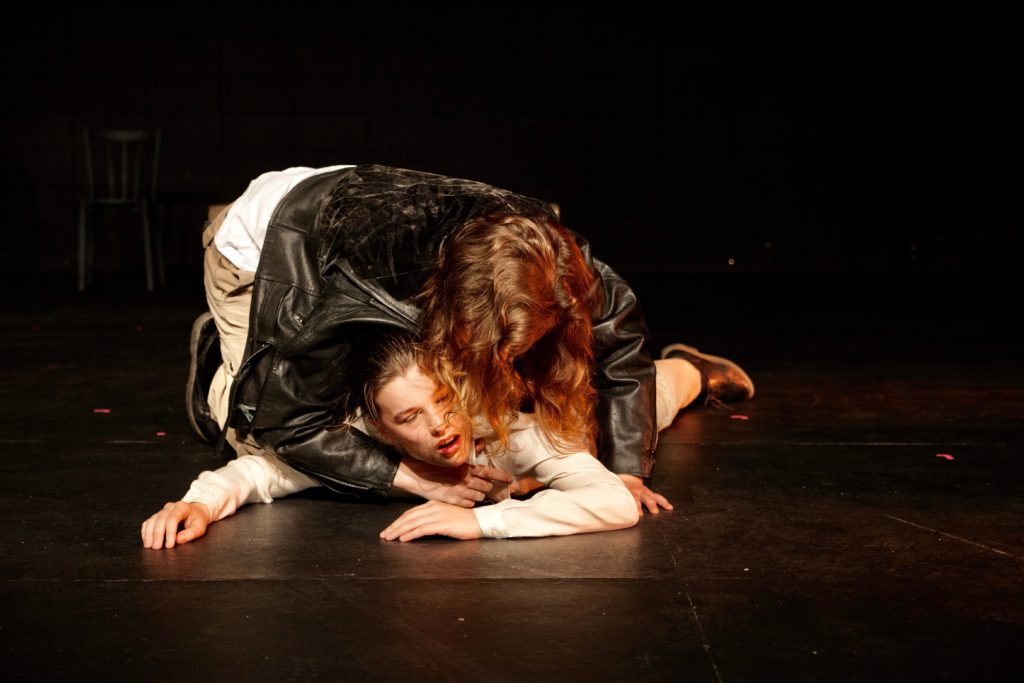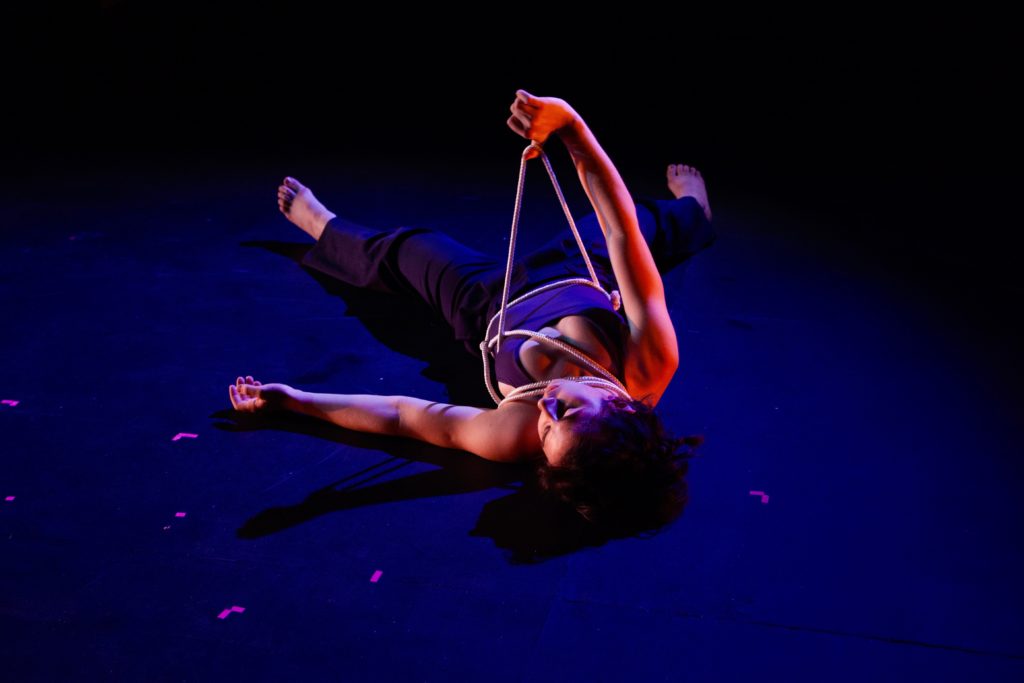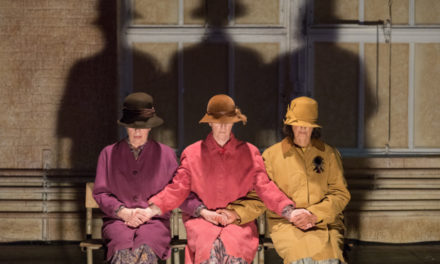Adapted from Michel Foucault’s seminal text Discipline and Punish, the collaboratively-written and devised performance Docile Bodies—by performance company Wig in a Box—explores how institutional power shapes the lives and minds of soldiers and, in turn, ourselves. Structured around the monologues of six soldiers— ranging from the twisted diatribes of a drone pilot to the painful recollections of a soldier suffering from PTSD—Docile Bodies explores how the machine of institutional power invades the unconscious psyche and body. While each soldier speaks, the others watch from the peripheries of the stage in homage to Foucault’s panopticon and as a reminder to the audience that the machine is always monitoring and listening. The various monologues are woven together with dance, music, sound, and movement to create a sense of cohesion and purpose. Gender and queerness complicate the issues at hand as the all female-identifying cast tackles issues of toxic masculinity, misogyny, and homophobia.
Docile Bodies was made through a process of collective creation. All six performers, as well as a team of collaborators, were involved in the writing process over a period of five months. Each performer drew from their own experiences and conducted their own extensive research on military life in order to create raw and intensely personal characters. In group rehearsals, the team undertook various collaborative writing exercises and creation activities in order to generate content not from a script but rather from the creative expression of the group. Michelle Soicher, the stage manager of Docile Bodies, explains the complexity of managing the unscripted territory of a devised performance: “Sometimes these discussions and emotional sharing moments were really beautiful and really important and really productive, but there’s no guidebook for what percentage of rehearsal is discussion, what percentage of rehearsal is exploration, and what percentage of rehearsal is creation of stuff to be shared.” It was Soicher’s job to guide the group, not as an author but as a collaborator. “It’s wonderful and it’s a great challenge,” she explains.
Co-director Lisa Saban and co-director Natalie Liconti, who also produced and performed in the piece, describe where the inspiration for the project came from. Starting with Foucault’s text, and particularly the chapter entitled “Discipline,” the team wanted to explore how discipline shapes social life. While Foucault offers a productive jumping-off point, Liconti points out that the text’s theoretical density also posed a barrier: “We felt that we could only talk about some of the [topics] from our quite privileged position and we did a lot of research to make sure we were doing justice to what we were talking about,” she says. Saban goes on to explain that “we as performers and people who are involved in the theatre found the discipline of the theatre really interesting.” Consequently, Docile Bodies not only deals with the topic of institutionalized power and discipline in the lives of soldiers but questions how the theatre itself might become an extension of such forces. By creating the play collaboratively, the team hoped to deconstruct the hierarchies of the theatre: there is no script, no single author, and no star performer. Thus, the process of creating the play challenged the content of the play itself. Military structures of power, obedience, and repetition are cast into doubt by the practice of collective creation.
Throughout Docile Bodies the performers pelt the audience with tough questions—is toxic masculinity attractive? is easier better? is the military a metaphor? But for those interested in performance art as activism, their most interesting question may just be what is more important, the process or the product?As a member of the audience, I found Docile Bodies to be a demanding performance to watch both in terms of subject matter and staging. Performers spoke directly to the audience, and I often felt as though they were looking straight at me. Lighting contributed to this sensation as bright streams of light often spilled over onto the audience itself, blurring the line between performer and spectator. Consequently, I felt implicated in each soldier’s story. After all, if the military is an extension of society, aren’t we all responsible for their actions?
Docile Bodies will be performed at the Montreal Fringe Festival (May 29 – June 18)
Docile Bodies premiered at La Chapelle Scènes Contemporaines, Montréal, from May 11-13 2016; Produced by Natalie Liconti
Directors: Natalie Liconti and Lisa Saban
Stage manager/collaborator: Michelle Soicher
Sound designer/ collaborator: Joseph Browne
Dramaturge: Noah Witte-Winnette
Performers: Lucy Fandel, Beata Groves, Emilie Slotine, Sarah Foulkes, Emily Sirota, Natalie Liconti
Set, props, costumes: Holly Hilts
Lighting designer: Darah Miah
Photographer/ Videographer: Lola Ertel
This review was originally written by Willow White for Alttheatre.ca. Reposted with permission. To read the original review, click here.
This post was written by the author in their personal capacity.The opinions expressed in this article are the author’s own and do not reflect the view of The Theatre Times, their staff or collaborators.
This post was written by Willow White.
The views expressed here belong to the author and do not necessarily reflect our views and opinions.





















